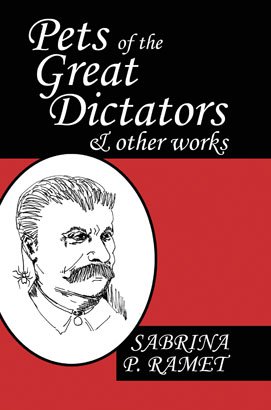
About the Author
Sabrina P. Ramet is a Professor of Political Science at The Norwegian University of Science and Technology in Trondheim, Norway, and the author of 11 scholarly books. She is also the editor or co-editor of 21 scholarly books and the author of the comic novella Café Bombshell: The International Brian Surgery Conspiracy.
Christine M. Hassenstab, who prepared the artwork for this volume, was a public defender in a previous life and is currently putting the finishing touches on her Ph.D. dissertation in the Department of Sociology at The Norwegian University of Science and Technology. She also paints in acrylic. She and Sabrina have a cat named Sasha, a sweet and lovable ball of fluff.
PETS OF THE GREAT DICTATORS & Other Works
Sabrina P. RametScarith, 2008
152 Pages, 24 Illustrations
ISBN 978-0-9818654-2-3 Paperback
For BULK ORDERS, order directly from New Academia Publishing.
Queries: orders@newacademia.com
About the Author
Sabrina P. Ramet is a Professor of Political Science at The Norwegian University of Science and Technology in Trondheim, Norway, and the author of 11 scholarly books. She is also the editor or co-editor of 21 scholarly books and the author of the comic novella Café Bombshell: The International Brian Surgery Conspiracy.
Christine M. Hassenstab, who prepared the artwork for this volume, was a public defender in a previous life and is currently putting the finishing touches on her Ph.D. dissertation in the Department of Sociology at The Norwegian University of Science and Technology. She also paints in acrylic. She and Sabrina have a cat named Sasha, a sweet and lovable ball of fluff.
About the book
Dictators’ pets are too often ignored–but no longer! They’re all here in this hilarious collection of madcap ditties: Lenin’s cat, Hitler’s dog, Qaddafi’s sweet-scented camel, Caligula’s horse, Mao’s cockroach (he banned real pets), Stalin’s spider, and many more. The volume also includes philosophers’ songs and a Holy Roman opera, “Turmoil in Brindisi” about a long-forgotten ecumenical council called by Pope Sixtus the Sixth, an equally forgotten pope. Written over a period of 35 years, these jottings are also a record of a lifetime of laughter.
Praise
“Sabrina Ramet’s collection of ditties is sidesplittingly hilarious! What a great idea to deal with the defining concept or characteristics of world’s dictators and their pets and philosophers in poems in a humorous way! What is even more important, Ramet with her poems touches us on a deeper level—as human beings with universal human traits.”
-Lea Plut-Pregelj, University of Maryland
“This is a unique publication. Professor Sabrina Ramet has shown how humour can (and should) be used to unmask and demystify dictators and dictatorships. Funny and serious at the same time, these ditties include many authentic touches, such as the reference to self-criticism in the ditty about Ceausescu. The philosophers’ songs are also great fun, combining witty summaries of some of their major ideas with wild humour.”
– Knut Erik Solem, Norwegian University of Science & Technology





 Coming Soon
Coming Soon Awards
Awards